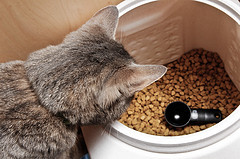FDA Proposes New Rules To Make Pet Food More Acceptable Image courtesy of (jonasflanken)
Great news for animals who like non-poisonous food! Fresh on the heels of the Food and Drug Administration’s plea for help in solving the mystery of why pet treats imported from China have allegedly killed more than 600 dogs and a few cats, today the agency proposed new rules to protect animal food from contamination from microbes, toxic chemicals, and other scary contaminants.
Protecting animal food isn’t just to prevent the heartbreak that happens when your pet drops dead of treat poisoning. When pet food has some kind of nasty food-borne illness, cross-contamination can make the humans in your household sick as well. The proposed rules would cover the food given to livestock, too: that is, the animals that we eat. Toxic substances in cattle feed could end up in your steak.
It may surprise you to learn that the FDA doesn’t regulate the safety of animal food. When there’s a reported problem or contamination, the agency gets involved, helping to investigate and to administer recalls. What it hasn’t yet done is put rules and procedures in place for pet food manufacturers to follow.
The proposed rules would put in place best practices for pet food manufacturing facilities. There would be rules in place regulating the manufacturing, processing, packing and holding of raw materials and finished food products.
Facilities would be required to have a written food safety plan and analyze potential hazards. This is similar to the Preventive Controls for Human Food put in place earlier this year, but with some differences that reflect the unique problems of animal foods. For example, nutritional imbalances, such as when a cat food lacks taurine, are a bigger problem in pet food because they’re meant to comprise all or most of an animal’s diet. Until Bachelor Chow (TM) becomes a reality, that isn’t the case for human foods.
FDA Moves to Keep Foods Safe for Animals [FDA]
FDA proposes rules to make animal food safer [USA Today]
Want more consumer news? Visit our parent organization, Consumer Reports, for the latest on scams, recalls, and other consumer issues.


